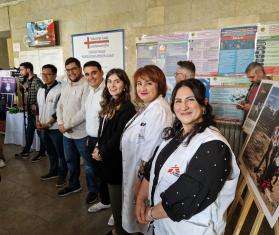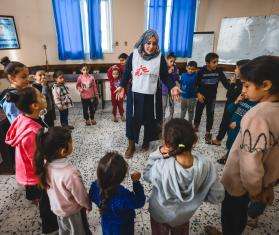Dr. Abu Wassim was working inside the East Aleppo hospital that was hit by airstrikes on November 17, 2016. Here, in an interview recorded a week later, he tells the story of that day:
“We started hearing shells raining down on the buildings at the end of the street, about 500 meters away from the hospital. We heard 40 or more shells exploding, with the noise moving closer and closer towards the hospital. That’s when all the staff—technicians, nurses and doctors—evacuated all the patients down to the basement.
We moved about 15 patients in total, including a child in the intensive care unit who had had surgery after sustaining an injury to his heart. He started to gain consciousness as the shells fell on the street outside the window of the intensive care unit. We had to disconnect him from the ventilator to take him down to the basement.
The bombing lasted for two hours. During that time, the shelling never stopped. The basement was very crowded. There were patients lying on the floor.
Photo Essay: Inside a Hospital Destroyed by Airstrikes
We had one fatality amongst our staff as a result of the bombing. One of the hospital attendants was injured by shrapnel that pierced his chest and severed a major blood vessel. He lost a lot of blood and we had to operate on him without electricity. We were unable to save him, and he died.
Before the bombardment, I had been in the operating theater performing an amputation. After the bombing, I had to finish the surgery with an LED lamp because there was no electricity. Our mobile oxygen concentrator was completely burnt to pieces.
We could not discharge any patients during the bombing, because no ambulances could come to the hospital as long as it continued. But as soon as the bombardment eased off, we organized for ambulances to come to the back entrance of the hospital and evacuate the patients to nearby health centers.
The front entrance of the hospital was totally inaccessible, blocked by rubble from all the damage and destruction. All of the cars parked in front of the hospital were completely burnt out, and an ambulance was totally destroyed.
Many of our staff had been staying on the upper floors of the hospital. These floors were now damaged and left uninhabitable. There were no longer any doors or windows. So our staff had to try and find somewhere else to sleep.”





